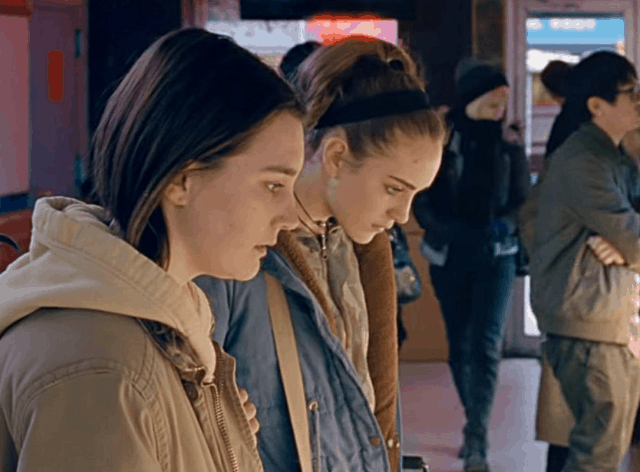1 in 4. 1 is someone you know. Yet statistics still feel so hollow sometimes, the faceless numbers easy to contort into some semblance of an argument to overturn one of the most critical cases in this nation’s history.
It’s not a coincidence that writer-director Eliza Hittman’s latest film Never Rarely Sometimes Always has garnered awards at the Sundance Film Festival and the 70th Berlin International Film Festival for its realistic portrayal of a teenage girl trying to receive an abortion. It is a surprise however that it took this long for a film to so truthfully–so naturally–tell this story, especially with an important PG-13 rating.
17-year-old Autumn (Sidney Flanigan) discovers she’s pregnant. A so-called women’s clinic inaccurately tells her how many weeks she is, and flusters Autumn with pamphlets for adoption and father’s rights. Abortion is not an option there, and upon sensing Autumn’s hesitation, the ultrasound technician shows her an “educational” video about the dangers of the procedure. Autumn resorts to at-home attempts to induce a miscarriage with no success and ultimately punches her stomach to the point of severe bruising. In a graphic attempt to control something about her own body, Autumn pierces her nose with a paper clip before heading to work as a grocery store clerk with her cousin, Skyler (Talia Ryder).
The simple surrounding details show us what Autumn’s daily life is like: drinking beer with her parents as she disdainfully glances at her toddler siblings; her father inappropriately rubbing their female dog in a move that is both creepy and crass; her supposed ex-boyfriend publicly yelling that she’s a “slut”; begrudgingly allowing her boss to kiss and lick her arm before leaving. We learn that Autumn has been sexually active since 14, with implications that it wasn’t always her choice to be.
There is the emptiness of being 17, and then there’s the emptiness of being stuck. Autumn and Skyler feel both, albeit in different ways.
The cousins embark to New York to find access to abortion care. From bus rides to subway hopping, from Brooklyn to the Lower East Side, the girls dodge threatening men and try to wait out the two-day procedure by sleeping in stations and using public bathrooms. Upon using their funds on Autumn’s abortion, Skyler stoops to the only option they have: using their sole New York contact (Théodore Pellerin) for bus fare. Autumn holds Skyler’s hand as she blandly kisses him, knowing to give him what he wants is the only way out.
It’s easy to categorize Never Rarely as an abortion drama, or deem it a neorealist depiction of a day in the life of an abortion-seeking woman. And yet this is really a film about isolation and an immediate world without options, one that holds girls captive until they give in.
Yes, New York was a saving grace for Autumn, and the Planned Parenthood support network was touchingly compassionate to her. But Autumn doesn’t live there. She lives elsewhere, back where she’ll return to work at the local grocery store, back where she can’t get access to the healthcare she needs, back where she and Skyler will struggle and wait and test their own resilience over a lifetime.
As they board the bus to return, it’s clear what they’re thinking: why do we have to go back?
Should any of us have to?



